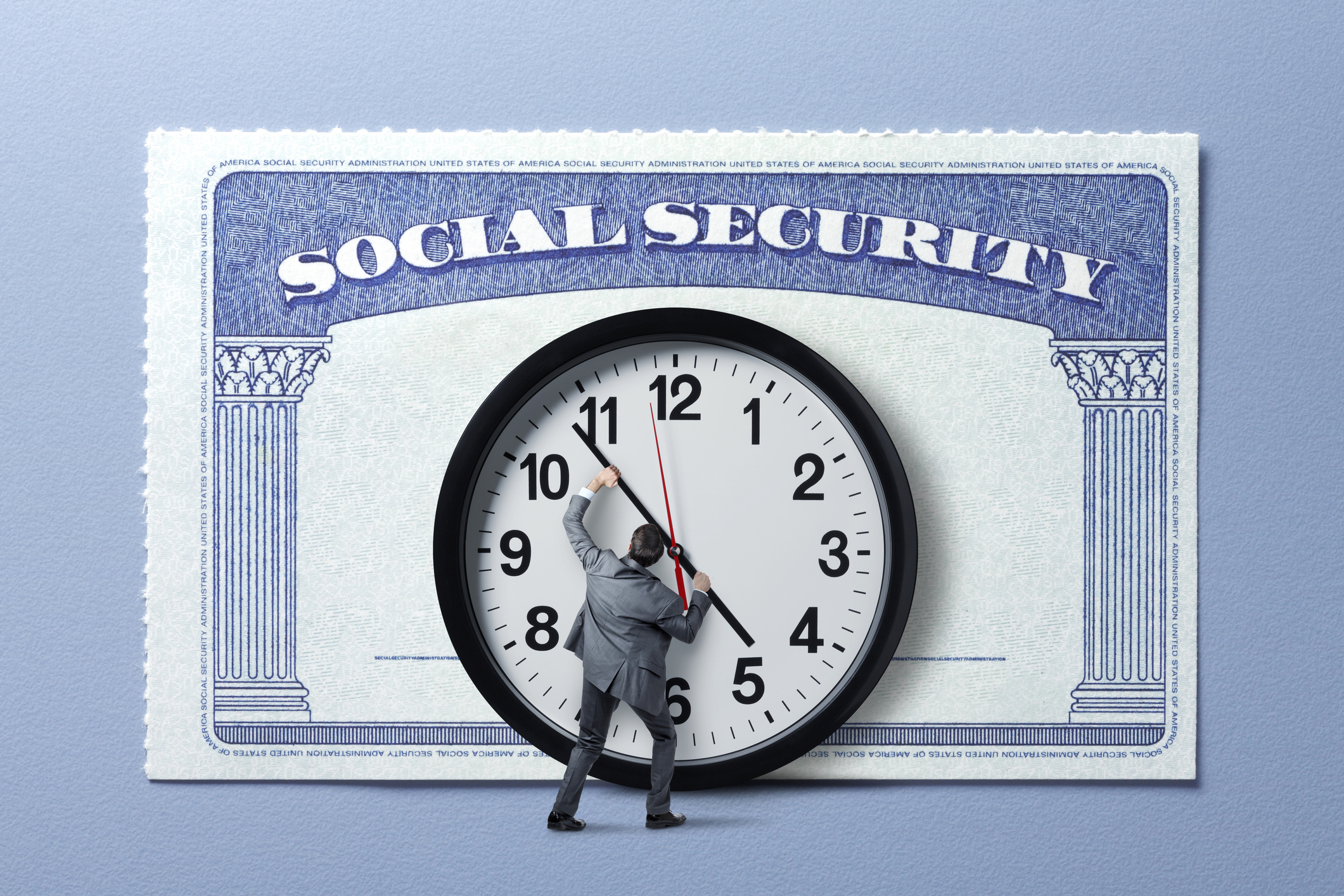Want the Maximum Social Security Check in 2026? Here's What You Need to Do Now
As 2025 winds down, the maximum Social Security check sits at $5,108. Want the top-tier payout in 2026 — or at least the biggest check possible down the line? Act before the ball drops.


Profit and prosper with the best of Kiplinger's advice on investing, taxes, retirement, personal finance and much more. Delivered daily. Enter your email in the box and click Sign Me Up.
You are now subscribed
Your newsletter sign-up was successful
Want to add more newsletters?

Delivered daily
Kiplinger Today
Profit and prosper with the best of Kiplinger's advice on investing, taxes, retirement, personal finance and much more delivered daily. Smart money moves start here.

Sent five days a week
Kiplinger A Step Ahead
Get practical help to make better financial decisions in your everyday life, from spending to savings on top deals.

Delivered daily
Kiplinger Closing Bell
Get today's biggest financial and investing headlines delivered to your inbox every day the U.S. stock market is open.

Sent twice a week
Kiplinger Adviser Intel
Financial pros across the country share best practices and fresh tactics to preserve and grow your wealth.

Delivered weekly
Kiplinger Tax Tips
Trim your federal and state tax bills with practical tax-planning and tax-cutting strategies.

Sent twice a week
Kiplinger Retirement Tips
Your twice-a-week guide to planning and enjoying a financially secure and richly rewarding retirement

Sent bimonthly.
Kiplinger Adviser Angle
Insights for advisers, wealth managers and other financial professionals.

Sent twice a week
Kiplinger Investing Weekly
Your twice-a-week roundup of promising stocks, funds, companies and industries you should consider, ones you should avoid, and why.

Sent weekly for six weeks
Kiplinger Invest for Retirement
Your step-by-step six-part series on how to invest for retirement, from devising a successful strategy to exactly which investments to choose.
In the waning days of 2025, the maximum Social Security check stands at $5,108 per month, and it's set to rise next year with the just-announced 2.8% COLA. While it's an impressive figure, in reality, not many people qualify for the maximum amount. The good news is that there are ways to maximize your benefits now to increase your check for 2026.
How can you get the maximum Social Security benefit? If you want it, you’ll have to earn it. That said, getting the biggest share of the pot depends on more than just a high salary; your work, your age, marital status, and retirement decisions also count.
Even if you can't get the maximum benefit, there are several ways you can increase the amount that you can get.
From just $107.88 $24.99 for Kiplinger Personal Finance
Become a smarter, better informed investor. Subscribe from just $107.88 $24.99, plus get up to 4 Special Issues

Sign up for Kiplinger’s Free Newsletters
Profit and prosper with the best of expert advice on investing, taxes, retirement, personal finance and more - straight to your e-mail.
Profit and prosper with the best of expert advice - straight to your e-mail.
Average monthly Social Security benefits in 2025
The estimated average monthly Social Security benefits payable in 2025 after the 2.5% COLA was applied has meant an additional $49 for the average retiree. That has increased the average Social Security check to $1,976 in 2025, up a few dollars from $1,927 in 2024. Married couples have seen an average increase of $75, raising their monthly benefit to $3,089 from $3,014 in 2024.
- All retired workers: $1,976
- Married Couples, both receiving benefits: $3,089
- Widowed mother with two children: $3,761
- Widow(er) alone: $1,832
- Disabled worker, spouse and one or more children: $2,826
- All disabled workers: $1,580
Average monthly Social Security benefits in 2026
In 2026, the average monthly Social Security retirement benefit is projected to be $2,071. That figure takes into account a 2.8% cost-of-living adjustment (COLA) announced by the Social Security Administration in October. That's an increase of about $56 per month, resulting in an average monthly check of $2,071, versus the 2025 average of $2,015. The amount provides a modest boost to the roughly 71 million beneficiaries who rely on these payments to cover essentials like housing, food and healthcare. For married couples, the average payout will rise to $3,208, up $88 from 2025.
While this adjustment lines up with recent inflation trends, it falls short of the historical average COLA of around 3.1% over the past decade.
Unfortunately, the net gain for many could be watered down by rising Medicare Part B premiums, expected to climb 11.6% to $206.50 per month — a $21.50 hike that will be deducted directly from benefits for most enrollees. This could effectively reduce the COLA benefit to about $34.50 for the average recipient, eating up nearly 40% of the increase and highlighting the ongoing financial challenges for many retirees.
Although there are no shortcuts to the maximum benefit, here are several tips for getting the most out of your Social Security next year.
Earn a higher wage now to increase your benefit later
This year, the maximum Social Security retirement benefit is $5,108 per month, according to the Social Security Administration. However, this maximum Social Security benefit applies only to high earners with 35 years of maximum taxable earnings who delay claiming until age 70. For comparison, the average Social Security benefit this year is $1,976 per month, far below the maximum, highlighting that few retirees qualify for $5,108.
So, wouldn’t it be nice if you could wave a magic wand and earn a higher wage in 2026? Absolutely. That’s because your retirement benefit depends primarily on your lifetime earnings.
In 2025, the maximum income subject to Social Security tax was $176,100 (rising $8,400 to $184,500 in 2026). So, even if you make over one million in wages before the year ends, Social Security will still only consider your annual taxable maximum income of $176,100. However, there is an earnings cap imposed by Social Security, so any money above that amount won’t affect your future benefits.
Work longer to increase your benefits

Social Security uses your 35 highest-earning years to calculate your monthly benefit. To qualify for a benefit at all, you will need to work the equivalent of ten years of full-time work. However, you’ll get the biggest benefit if you work for at least 35 years. That means, if you only work for 28 years, Social Security will use your 28 years of earnings (plus seven zeros, adding up to 35) to calculate your benefit. If you work more than 35 years, Social Security will take your 35 highest-earning years to calculate your benefit, meaning a higher Social Security check.
This is how it works: Social Security computes your benefits using "average indexed monthly earnings." This average sums up to 35 years of your indexed earnings.
Social Security applies a formula to this average to compute the primary insurance amount (PIA). The PIA is the basis for the benefits that are paid to an individual.
Wait to claim your benefits as long as possible
Delaying your Social Security benefit for as long as possible is one of the best ways to maximize your payments. Full retirement age (FRA) is the age when you qualify for 100% of your Social Security benefit.
You can take benefits as early as age 62, but every year you claim before your FRA reduces your benefit. If you wait beyond your FRA, you get a delayed retirement credit for each year until you reach 70. At that point, delayed retirement credits stop.
The table below shows you how much you and your spouse would lose if you began claiming Social Security benefits at age 62; when you start receiving benefits early, your benefits will be reduced by a small percentage for each month before your FRA. The percentage below reflects the total reduction to your benefits when you start collecting at age 62.
Birth Year | FRA | Number of reduction months | Primary - % reduction | Spouse - % reduction |
| Row 1 - Cell 0 | Row 1 - Cell 1 | Row 1 - Cell 2 | Row 1 - Cell 3 | Row 1 - Cell 4 |
1937 or earlier | 65 | 36 | 20% | 25% |
1938 | 65 and 2 months | 38 | 20.83% | 25.83% |
1939 | 65 and 4 months | 40 | 21.67% | 26.67% |
1940 | 65 and 6 months | 42 | 22.50% | 27.50% |
1941 | 65 and 8 months | 44 | 23.33% | 28.33% |
1942 | 65 and 10 months | 46 | 24.17% | 29.17% |
1943 - 1954 | 66 | 48 | 25% | 30% |
1955 | 66 and 2 months | 50 | 25.83% | 30.83% |
1956 | 66 and 4 months | 52 | 26.67% | 31.67% |
1957 | 66 and 6 months | 54 | 27.50% | 32.50% |
1958 | 66 and 8 months | 56 | 28.33% | 33.33% |
1959 | 66 and 10 months | 58 | 29.17% | 34.17% |
1960 and later | 67 | 60 | 30% | 35% |
If you’re still working but take your benefits early, it’s possible your benefits will be reduced in 2026:
- Under FRA in 2026: $1 in Social Security benefits is withheld for every $2 earned above $24,480.
- Reaching FRA in 2026: $1 in benefits is withheld for every $3 earned above $65,160, until the month FRA is reached. No limit applies after FRA.
However, Social Security will give you credit for the benefits withheld and recalculate your benefit at a higher amount once you reach your full retirement age. If you live long enough, you may be able to recoup the money withheld. The good news is that when you reach your FRA, your earnings no longer affect your benefits.

Stop your benefits if you claimed too early
It is possible to claim your Social Security benefits too early and regret it later on. It happens. If that’s you, you must act fast to reverse your mistake. Social Security allows you to step back on your application if it’s been less than 12 months since you started benefits.
But remember that you’ll have to repay everything you received up to that time, including Medicare premiums and taxes. You can restart your Social Security for a higher amount whenever you’re ready, but Social Security will automatically start your payments once you turn 70. Also, you can only withdraw your application once in your lifetime; this is a one-time option.
Plan ahead for 2026
Very few people get the maximum Social Security benefit amount, so you may have to make do with less when you eventually retire. But Social Security was never meant to be your sole income in retirement, so the less you have to rely on it, the better off you’ll be.
The most recent data from the Federal Reserve’s Economic Well-Being of U.S. Households report indicates that 67% of non-retirees had a retirement account (like a 401(k), IRA, etc.), and 33% had no retirement savings at all.
The same report states that the most common source of retirement income for retirees is Social Security. However, 80% had one or more sources of income outside of Social Security, such as a pension, an employer-sponsored retirement savings plan, rental income, or working beyond the age of 65. Investing, saving, and planning are all things you can do this year to prepare for your best 2026.
You can still maximize your benefit
There are ways to maximize your Social Security benefit, even if you don't qualify for the maximum. If you’re unsure where or how to make that happen, connect with a financial planner who can lay out a plan to ensure your finances are in good shape when you do eventually retire.
Related Content
Profit and prosper with the best of Kiplinger's advice on investing, taxes, retirement, personal finance and much more. Delivered daily. Enter your email in the box and click Sign Me Up.

For the past 18+ years, Kathryn has highlighted the humanity in personal finance by shaping stories that identify the opportunities and obstacles in managing a person's finances. All the same, she’ll jump on other equally important topics if needed. Kathryn graduated with a degree in Journalism and lives in Duluth, Minnesota. She joined Kiplinger in 2023 as a contributor.
-
 Quiz: Do You Know How to Avoid the "Medigap Trap?"
Quiz: Do You Know How to Avoid the "Medigap Trap?"Quiz Test your basic knowledge of the "Medigap Trap" in our quick quiz.
-
 5 Top Tax-Efficient Mutual Funds for Smarter Investing
5 Top Tax-Efficient Mutual Funds for Smarter InvestingMutual funds are many things, but "tax-friendly" usually isn't one of them. These are the exceptions.
-
 AI Sparks Existential Crisis for Software Stocks
AI Sparks Existential Crisis for Software StocksThe Kiplinger Letter Fears that SaaS subscription software could be rendered obsolete by artificial intelligence make investors jittery.
-
 Quiz: Do You Know How to Avoid the 'Medigap Trap?'
Quiz: Do You Know How to Avoid the 'Medigap Trap?'Quiz Test your basic knowledge of the "Medigap Trap" in our quick quiz.
-
 We Retired at 62 With $6.1 Million. My Wife Wants to Make Large Donations, but I Want to Travel and Buy a Lake House.
We Retired at 62 With $6.1 Million. My Wife Wants to Make Large Donations, but I Want to Travel and Buy a Lake House.We are 62 and finally retired after decades of hard work. I see the lakehouse as an investment in our happiness.
-
 Social Security Break-Even Math Is Helpful, But Don't Let It Dictate When You'll File
Social Security Break-Even Math Is Helpful, But Don't Let It Dictate When You'll FileYour Social Security break-even age tells you how long you'd need to live for delaying to pay off, but shouldn't be the sole basis for deciding when to claim.
-
 One of the Most Powerful Wealth-Building Moves a Woman Can Make: A Midcareer Pivot
One of the Most Powerful Wealth-Building Moves a Woman Can Make: A Midcareer PivotIf it feels like you can't sustain what you're doing for the next 20 years, it's time for an honest look at what's draining you and what energizes you.
-
 I'm a Wealth Adviser Obsessed With Mahjong: Here Are 8 Ways It Can Teach Us How to Manage Our Money
I'm a Wealth Adviser Obsessed With Mahjong: Here Are 8 Ways It Can Teach Us How to Manage Our MoneyThis increasingly popular Chinese game can teach us not only how to help manage our money but also how important it is to connect with other people.
-
 Looking for a Financial Book That Won't Put Your Young Adult to Sleep? This One Makes 'Cents'
Looking for a Financial Book That Won't Put Your Young Adult to Sleep? This One Makes 'Cents'"Wealth Your Way" by Cosmo DeStefano offers a highly accessible guide for young adults and their parents on building wealth through simple, consistent habits.
-
 Global Uncertainty Has Investors Running Scared: This Is How Advisers Can Reassure Them
Global Uncertainty Has Investors Running Scared: This Is How Advisers Can Reassure ThemHow can advisers reassure clients nervous about their plans in an increasingly complex and rapidly changing world? This conversational framework provides the key.
-
 5 Ronald Reagan Quotes Retirees Should Live By
5 Ronald Reagan Quotes Retirees Should Live ByThe Nation's 40th President's wit and wisdom can help retirees navigate their financial and personal journey with confidence.